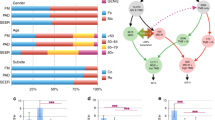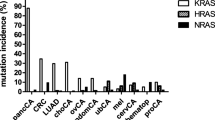Abstract
PURPOSE: We designed this study to assess the frequency of K-ras mutations in patients with resected colorectal tumors and their association with survival. A second objective was to analyze the prognostic value of different K-ras genotypes. In a subgroup of patients we also investigated the presence of allelic imbalance on chromosome 18q and its relationship to clinical outcome. METHODS: One hundred fourteen colorectal tumors resected between 1983 and 1986 were analyzed to detect K-ras point mutations at codons 12, 13, and 61 by polymerase chain reaction followed by allele specific oligonucleotide hybridization. A subgroup of 77 tumors was further screened to detect loss of heterozygosity on chromosome 18q using three polymorphic microsatellite markers (D18S67, D18S474 andD18S58). RESULTS: K-ras mutations were detected in 29 percent (33/114) of patients. K-ras mutations correlated with age and preoperative carcinoembryonic antigen levels, and there was some indication that they may be linked to poor survival, especially in Stage II tumors, where a subgroup of patients with aspartic and serine mutations showed significantly reduced survival (P=0.03) compared with K-ras-negative patients. 18q loss of heterozygosity was present in 39 percent (25/63) of tumors. A multivariate analysis of Stage II tumors showed that 18q loss of heterozygosity was significantly associated with a worse prognosis (P=0.006). A significant decrease in survival was identified in ten patients harboring both genetic alterations (K-i mutations and 18q loss of heterozygosity;P=0.02). CONCLUSIONS: In colorectal tumors, K-ras mutations and 18q loss of heterozygosity are two genetic markers which may identify patients with more aggressive behavior, mainly in Stage II tumors. These findings warrant further research, because they can be useful in customizing adjuvant chemotherapy.
Similar content being viewed by others
References
Cohen AM, Tremiterra S, Candela F, Thaler HT, Sigurdson ER. Prognosis of node-positive colon cancer. Cancer 1991;67:1859–61.
Newland RC, Dent OF, Chapuis PH, Bokey L. Survival after curative resection of lymph node negative colorectal carcinoma. Cancer 1995;76:564–71.
Erlichman C, Marsoni S, Seitz JF,et al. Event free and overall survival is increased by FUFA in resected B colon cancer: a pooled analysis of five randomized trials (RCTS)[abstract]. Proc Am Soc Clin Oncol 1997;16:280.
Barbacid M. Ras genes. Ann Rev Biochem 1987;56:779–827.
Volgestein B, Fearon ER, Hamilton SR,et al. Genetic alterations during colorectal-tumor development. N Engl J Med 1988;319:525–32.
Benhattar J, Losi L, Chaubert P, Givel JC, Costa J. Prognostic significance of K-ras mutations in colorectal carcinoma. Gastroenterology 1993;104:1044–48.
Laurent-Puig P, Olschwang S, Delattre O,et al. Survival and acquired genetic alterations in colorectal cancer. Gastroenterology 1992;102:1136–41.
Bell SM, Scott N, Cross D,et al. Prognostic value of p53 overexpression and c-Ki-ras gene mutations in colorectal cancer. Gastroenterology 1993;104:57–64.
Finkelstein SD, Sayegh R, Bakker A, Swalsky P. Determination of tumor aggressiveness in colorectal cancer by K-ras-2 analysis. Arch Surg 1993;128:526–32.
Peinado MA, Fernandez-Renart M, Capella G, Wilson L, Perucho M. Mutations in the p53 suppressor gene do not correlate with c-K-ras oncogene mutations in colorectal cancer. Int J Oncol 1993;2:123–34.
Jen J, Kim H, Piantadosi S,et al. Allelic loss of chromosome 18q and prognosis in colorectal cancer. N Engl J Med 1994;331:213–21.
Shibata D, Reale MA, Lavin P,et al. The DCC protein and prognosis in colorectal cancer. N Engl J Med 1996;335:1727–32.
Slebos RJ, Boerrigher L, Evers SG, Wisman P, Mooi WJ, Rodenhuis S. A rapid and simple procedure for the routine detection of ras point mutations in formalin-fixed paraffin-embedded tissues. Diagn Mol Pathol 1992;1:136–41.
Bos JL. Ras oncogenes in human cancer. A review. Cancer Res 1989;49:4682–9.
Volgestein B, Fearon ER, Kern SE,et al. Alleotype of colorectal carcinomas. Science 1989;244:207–11.
Breivik J, Meling GI, Spurkland A, Rognum TO, Gaudernack G. K-ras mutation in colorectal cancer: relations to patient age, sex and tumor location. Br J Cancer 1994;69:367–71.
Oudejans JJ, Slebos RJ, Zoetmulder FA, Mooi WJ, Rodenhuis S. Differential activation of ras genes by point mutation in human colon cancer with metastases to either lung or liver. Int J Cancer 1991;49:875–9.
Fearon ER, Vogelstein B. A genetic model for colorectal tumorigenesis. Cell 1990;61:759–67.
Ahnen DJ, Feigl P, Quan G,et al. Ki-ras mutation and p53 overexpression predict clinical behaviour of colorectal cancer: a Southwest Oncology Group Study. Cancer Res 1998;58:1149–58.
Miyahara M, Saito T, Kaketani K,et al. Clinical significance of ras p21 overexpression for patients with an advanced colorectal cancer. Dis Colon Rectum 1991;34:1097–102.
Tanaka M, Omura K, Watanabe Y, Oda Y, Nakanishi I. Prognostic factors of colorectal cancer: K-ras mutation, overexpression of the p53 protein, and cell proliferative activity. J Surg Oncol 1994;57:57–64.
Morrin M, Kelly M, Barrett N, Delaney P. Mutations of Ki-ras and p53 genes in colorectal cancer and their prognostic significance. Gut 1994;35:1627–31.
Dix BR, Robbins P, Soong R, Jenner D, House AK, Iacopetta BJ. The common molecular genetic alterations in Dukes' B and C colorectal carcinomas are not short-term prognostic indicators of survival. Int J Cancer 1994;59:747–51.
Markowitz S, Hines JD, Lutterbaugh J,et al. Mutant K-ras oncogenes in colon cancers do not predict patient's chemotherapy response or survival. Clin Cancer Res 1995;1:441–5.
Pricolo VE, Finkelstein SD, Wu TT,et al. Prognostic value of TP53 and K-ras-2 mutational analysis in stage III carcinoma of the colon. Am J Surg 1996;171:41–6.
Lee JC, Wang ST, Lai MD, Lin YJ, Yang HB. K-ras gene mutation is a useful predictor of the survival of early stage colorectal cancers. Anticancer Res 1996;16:3839–44.
Elnatan J, Goh HS, Smith DR. C-Ki-ras activation and the biological behaviour of proximal and distal colonic adenocarcinomas. Eur J Cancer 1996;32A:491–7.
Rosell R, Li S, Skacel Z,et al. Prognostic impact of mutated K-ras gene in surgically resected non-small cell lung cancer patients. Oncogene 1993;8:2407–12.
Rosell R, Li S, Anton A,et al. Prognostic value of K-ras 12 genotypes in patients with advanced non-small cell lung cancer receiving carboplatin with either intravenous or chronic oral dose etoposide. Int J Oncol 1994;5:169–76.
Sklar MD. Increased resistance to cis-diammine-dichoroplatinum (II) in NIH3T3 cells transformed by ras oncogenes. Cancer Res 1988;48:793–7.
Koo HM, McWilliams MJ, Alvord WG, Vande Woude GF.Ras oncogene-induced sensitization to 1-β-D-arabinofuranosylcytosine. Cancer Res 1999;56:5211–6.
Andreyev N, Norman AR, Cunningham D,et al. Kirsten ras mutations in patients with colorectal cancer: the multicenter RASCAL study. J Natl Cancer Inst 1998;90:675–84.
Schimanski CC, Linnemann U, Berger MR. Sensitive detection of K-ras mutations augments diagnosis of colorectal cancer metastases in the liver. Cancer Res 1999;59:5169–75.
Moerkerk P, Arends JW, van Driel M, De Bruine A, Goeij A, Ten Kate J. Type and number of Ki-ras point mutations relate to stage of human colorectal cancer. Cancer Res 1994;54:3376–8.
Rosell R, Monzo M, Molina F,et al. K-ras genotypes and prognosis in non-small-cell lung cancer. Ann Oncol 1995;6(Suppl 3):S15–20.
Martinez-Lopez E, Abad A, Font A,et al. Allelic loss on chromosome 18q as a prognostic marker in stage II colorectal cancer. Gastroenterology 1998;114:1180–7.
Ogunbiyi O, Goodfellow PJ, Herfarth K,et al. Confirmation that chromosome 18q allelic loss in colon cancer is a prognostic indicator. J Clin Oncol 1998;16:427–33.
Carethers JM, Hawn JK, Greenson JK, Hitchcock CL, Boland CR. Prognostic significance of allelic loss at chromosome 18q21 for stage II colorectal cancer. Gastroenterology 1998;114:1188–95.
Michel P, Merle V, Chiron A,et al. Postoperative management of stage II/III colon cancer: a decision analysis. Gastroenterology 1999;117:784–93.
Author information
Authors and Affiliations
About this article
Cite this article
Font, A., Abad, A., Monzó, M. et al. Prognostic value of K-ras mutations and allelic imbalance on chromosome 18q in patients with resected colorectal cancer. Dis Colon Rectum 44, 549–557 (2001). https://doi.org/10.1007/BF02234328
Issue Date:
DOI: https://doi.org/10.1007/BF02234328




